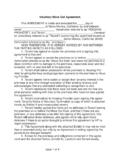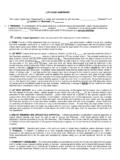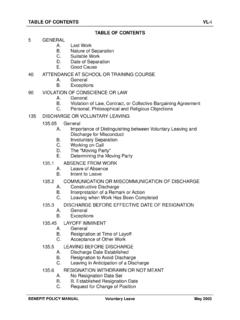Transcription of The Difference Between Mentoring and Coaching - …
1 34talent management magazine Difference Between Mentoring and CoachingValerie PelanFebruary 2012talent management magazine Coaching and Mentoring use many of the same skills, one is short term and task-based while the other promises a longer-term the following scenario. The vice presi-dent of human resources has just finished an in-depth discussion with the director of engi-neering about high employee turnover for one of the engineering teams. The manager of that team has a command and control leadership style, like a drill sergeant. His style has created a lot of tension and poor performance results. The vice president of HR told the engineering director the drill sergeant manager needed to change his management style, and reminded him that executive leadership mandated all managers use Mentoring and Coaching skills.
2 This manager needs to be more in tune with the company culture, and the engineering director scenario is common. There is confusion about Mentoring and Coaching skills. Part of the challenge is the terms are used interchangeably. Explaining the Difference Between Mentoring and Coaching with defi-nitions and examples can help managers change their style, and holding informal meetings with the man-agers can benefit the entire organization. Introducing new skills is not easy. Employees will have questions and need practical information and examples on how to mentor and coach. Talent leaders will need a practi-cal way to communicate the an article in the October issue of Strategy and Business magazine, authors Mark David Nevins and Stephen A.
3 Stumpf state that talented human capital will be the prime ingredient of future business success. The article said one way current leaders can support future leaders is to commit to an organizational cul-ture that values mentorship and Coaching and includes constructive and timely feedback. Coaching is about strategizing ways to handle situations; Mentoring is about providing guidance. The two often operate together. For instance, leadership Coaching can improve interpersonal communication style and decision making and as a result lead an em-ployee to become more engaged and productive. The coach can offer the employee advice and guidance.
4 The same employee also may receive suggestions from a mentor, who will act as a role model and help to man-age a potential career change. Despite some crossover, there is some Difference be-tween the two : This means helping the prot g succeed by providing guidance. The mentor-mentee relation-ship is characterized by a more experienced person helping the less-experienced person with political ad-vice, information and guidance about a company, an industry or his or her career: Mentors are usually older, more experienced and higher up in the organization, but outside the pro-t g s chain of command. Mentors act as role models. They focus on political skills and encourage self-de-velopment.
5 They provide advice on career next steps and can recommend the mentee for visible positions or at-tractive compensation packages. The mentor-prot g relationship works well when someone is starting out in a career or entering a new is an example of when Mentoring is effective. In this scenario the manager, Mary, is more experienced than Jane, and she is concerned Jane will negatively impact bottom-line revenue. This is the situation:Jane, a 25-year-old, is bright and highly educated but has a take-no-prisoners attitude when working with customers and other team members. She entered the department six months ago from graduate school and has produced considerable friction within the depart-ment and headaches for Mary in dealing with those outside the immediate department and customers.
6 When Mary approached Jane about being more dip-lomatic in various situations, Jane s response was, These people are in the wrong. Why is there a need for diplomacy? Mary decided to mentor Jane on how the team works with other company team members and customers. She set up meetings with Jane using a four-step struc-tured feedback THE WEBL ooking to increase the effectiveness of your Mentoring ? See High-Impact Mentoring at 201236talent management magazine one: Mary focused the discussion on specific be-haviors and their effect, not on personalities. In this case, it was Jane s take no-prisoners attitude that was upsetting customers and team members; they felt Jane was not listening and responding to their ques-tions.
7 Mary asked Jane for her perspective on the situation. Step two: Mary used Mentoring skills such as suggest-ing different ways to respond and interact in various situations. She suggested Jane view the situation from the customers perspective and gave her guidelines and ways she might try to handle the situation differently. Mary asked Jane to summarize what they had dis-cussed and asked her to try different approaches. They also set up a time for their next meeting to see how things were three: They both chose the time and place for their next meeting. This gave Jane the opportunity to dis-cuss how things were going with the new approach working on her listening skills and trying to see things from the customers team seemed supportive of Jane s efforts, and she said she felt the team was helping her as she continued to modify her approach.
8 Mary, acting as Jane s men-tor, suggested other roles Jane might be interested in pursuing. She introduced Jane to other leaders in the company and helped Jane with career four: Mary and Jane met several times to solidify the change in Jane s approach and to talk about career meetings can continue as the mentor-prot g relationship grows. In this situation, Mary used mentor-ing skills to guide and help Jane. Jane benefited from the relationship by receiving guidance, customer per-spective and ways to improve her communication skills. Coaching : The focus of Coaching is to improve perfor-mance and skills. Many don t realize the coach-coachee relationship is collaborative, a relationship of peers.
9 It s also a certifiable skill. The International Coaching Federation (ICF) certifies coaches and provides core competencies and a code of ethics. Traditionally, whether a coach is internal or external, the details of a Coaching session are confidential. A good coach-coachee relationship is based on trust and collaboration. External coaches can be brought in to of-fer an external strategic perspective; internal coaches have both a company and strategic perspective. Coach-ing usually supports the coachee in taking steps and actions that move him or her forward to achieve a goal; people are more likely to be engaged and accountable for solutions and goals they have designed.
10 Here are some guidelines for the coach-coachee rela-tionship: It is collaborative and starts from the coachee s strengths. Coaches ask open-ended questions to help the coachee strategize solutions and facilitate problem solving. Coaches do not give advice; they provide encourage-ment and urge continuous improvement. Coaches hold the coachee accountable for trying new things and using his or her strengths to get results. Coaches offer objective perspective and support the coachee s efforts to try new the following fictional situation to illustrate how Coaching could be effective with a high-potential employee whose leadership style was having a nega-tive impact on a key project , the manager, received some negative feedback about Paul, one of his high potentials.








